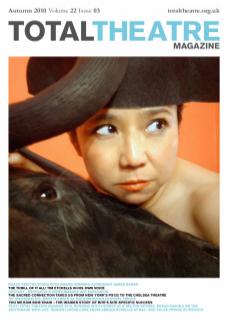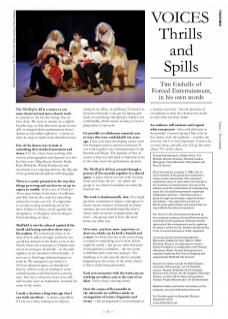The Thrill of it All is a return to our more theatrical and more chaotic work, in contrast to the last few things that we have done. We seem to operate in a slightly bi-polar way, so that after time spent on very still or stripped down performances there’s almost an inevitable explosion – a desire to take the stage in much more theatrical terms.
One of the desires was to look at something that involved movement and dance. For me, I have been working with various choreographers and dancers over the last few years (Meg Stuart, Fumiyo Ikeda, Kate McIntosh, Wendy Houstoun) and movement is an ongoing interest, the flip side of my general preoccupation with language.
There is a comic potential in the way that things go wrong and any bar we set up we expect to tumble. In the case of Thrill of it All we meet failure in the form of collisions and falls, but we also seek for something achieved to come out of it. It’s important to us that we drag something out of the mess. Failure is always on the agenda, but alongside it, or though it, we’re looking to find something of value...
Sheffield is not the cultural capital of the world and basing ourselves there was a bit random. We consciously chose to be away from London, though, and there was a political element in the desire to be in the North, where the resistance to Thatcherism was at its strongest. Ironically – in the mid-eighties, in the recession of that decade – it was easy to find large industrial spaces to work in. We managed to get hold of a 24-hour rehearsal space, an abandoned factory, within a year of starting to work – something that we’d find hard to come by now. The city is a base for most of us still, and in some ways an inspiration, certainly for some of the works.
I made a decision a long time ago that I can work anywhere – it means, regardless, if I am on a train; waiting at an airport; sitting in an office; or grabbing 15 minutes in between rehearsals I can get my laptop and work on something. My laptop is where I am comfortable, which means as long as I have a plug socket, I can work.
It’s possible to collaborate remotely now in ways that were unthinkable ten years ago. I have just been developing a piece with Ant Hampton and an enormous amount of our work together was communicated via the Internet and Skype. The paradox of this of course is that you still need to find time to be in the same room for performance projects.
The Thrill of it All was created through a process of five months together in a shared space. A space where you can work for long hours and share the air – see where the group is, see where it’s headed, see what the interests are.
The work is fundamentally slow. You might get lucky sometimes in improv and appear to create twenty minutes of material in twenty minutes, but any breakthrough like that is always built on weeks of preparation and error – the group work is slow. We don’t know any other way.
Over time, you have more experience to draw on, which can be both a benefit and a curse. To think that the work you’re doing is related to something you’ve done before might be useful – but just as often that kind of recognition is mistaken – the new work is different and you’re mis-seeing it. The challenge is to ask yourself what is actually happening in the room, in the work; what is it that is really being presented.
Each new encounter with the work you are working on reduces you to the state of an idiot. You’re always starting afresh.
Over the course of five months in the rehearsals we will have made an arrangement of scenes, fragments and events – that arrangement is an investigation, a journey, an event – but the presence of an audience is then the element that really reveals what you have made.
An audience will animate and expand what you present – they will add water to the powder. I am not saying I like to be in the theatre with the audience – it makes me nervous, but it is very important. I used to be at every show, and still now, I’d say I’m there about 75% of the shows.
Forced Entertainment is Robin Arthur, Tim Etchells (Artistic Director), Richard Lowdon (Designer), Claire Marshall, Cathy Naden and Terry O’Connor.
Since forming the company in 1984, the six core members of the group have sustained a unique artistic partnership. The company’s substantial canon of work reflects an interest in the mechanics of performance, the role of the audience and the machinations of contemporary urban life. Forced Entertainment’s trademark collaborative process – devising work as a group through improvisation, experimentation and debate – has made them pioneers of British avant-garde theatre and earned them an unparalleled international reputation.
The Thrill of it All (conceived and devised by the company) continues Forced Entertainment’s work both on the spectacle of theatre and the spectacle of the contemporary world, exploring the ways in which we live, breathe and tell stories in the circumscribed space of late capitalism.
Co-produced by Kunstenfestivaldesarts (Brussels), Hebbel am Ufer (Berlin), PACT Zollverein (Essen), Les Spectacles vivants – Centre Pompidou in collaboration with Festival d’Automne (Paris). Forced Entertainment is regularly funded by Arts Council England and supported by Sheffield City Council.
Autumn tour dates include: Nuffield Theatre, Lancaster (UK premiere, 12–13 October); Lyceum Theatre, Sheffield (15-16 October); Warwick Arts Centre (19–20 October); Riverside Studios, London (26 October–6 November); Contact Theatre Manchester (16–20 November).
Additional dates and further information on the company: www.forcedentertainment.com
Tim Etchells spoke to Alexander Roberts, September 2010. www.timetchells.com

